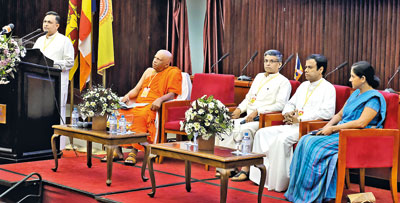News
Buddhist Business Forum: Speakers stress importance of revisiting Buddhist teachings
In the ever-changing globalised setting, the need to practice and propagate the teachings of Lord Buddha in every domain of society is unprecedented, and the world of business is no exception, Speaker, Karu Jayasuriya said on Tuesday.

Speaker Karu Jayasuriya addressing the forum
He was speaking at the Buddhist Business Forum 2018 which was held at the BMICH. The forum held under the banner, ‘Buddhist Leadership Practices in Business’, initiated by the National Council for International Affairs of the All Ceylon Buddhist Congress (ACBC), brought together notable business leaders, scholars, eminent Buddhist monks and other professionals to deliberate on the need to adopt the sublime doctrine of Lord Buddha in the world of business.
The Chief Guest, Speaker Jayasuriya, shed light on the increasing recognition of Buddhist values by leading global corporates. “The Buddhist meditation practice of vipassana for instance, is used by them, as a tool to develop emotional intelligence in order to achieve success both professionally and personally. Conflict management which forms an important component of theBuddhist corporate structure encourages peace and co-existence which is imperative to best management practices,” he noted.
Citing Buddhist concepts such as samma kammantha which gives space to propagate, sustainable business models in a modern sense, the Speaker urged the audience to revisit the teachings of the Buddha. Buddhist values, as he observed, can spur “a clean profile of an organisation while maintaining profits” through healthy means. The basis for the Sustainable Development Goals (SDGs) advocated by the UN, related to climate change and environmental impact, which underline business paradigms today are enshrined in the teachings of Lord Buddha, said Mr. Jayasuriya who went on to note that Buddhist practices will not only benefit the workforce of an organisation but also society at large.
President, National Council for International Affairs of the ACBC, Prof. Lakshman R. Watawala, in his opening remarks noted that the forum serves as a prelude to the International Buddhist Business Forum which is to take place next year in Sri Lanka as part of the ACBC’s centenary celebrations. A ‘Buddhist Business Circle,’ Prof. Watawala further remarked, is also envisaged as a by-product of this year’s forum. The move is to boost rural entrepreneurship, he said.
Rendering value to its theme, ‘Buddhist Leadership Practices in Business,’ the forum focussed on Buddhist ethics and spirituality, technology, innovation, education and skills development, social and environmental responsibilities and Buddhist Economics practicing the Middle Path with special reference to the Singalovada Sutta to achieve the optimal wellbeing of everyone in all these domains.

The panel of speakers at the forum. Pix by Amila Gamage
Elucidating Buddhist values in Business, Head of the Department of Pali and Buddhist Studies, University of Jayewardendepura, the Ven. (Prof) Madagampitiya Wijithadhamma Thera, in his keynote address, drew analogies from the Singalovada Sutta driving home the message that the Buddha’s teachings can be utilized in conflict-ridden businesses. “The customer or the ‘user first’ notion of the business world can only be achieved if compassion becomes the foundation of a business,” reflected the thera, who went on to note that the ticket to credibility, transparency and integrity of a business or a business leader lies in non-violence, empathy and collectivity, advocated by Buddhist values. Urging business leaders to achieve a win-win situation by keeping ‘one eye on profit and the other on ethics’, aligned with the Eightfold Path, the prelate emphasised the perennial truth of the Buddha’s teaching that avarice brings misery.
Management Consultant, Trainer and Author, Deepal Sooriyaarachchi elucidated Buddhist ethics and spiritualty in leading business organisations drawing inspiration from Buddhist teachings on wisdom, morality and energy. Urging businesses to create ‘win-win’ situations as opposed to ‘sales’ or ‘deals’, the senior professional emphasised on the need to contextualise the Buddha’s teachings.
Drawing parallels with Prince Siddhartha’s renunciation of worldly pleasures to ‘risk-taking,’ which entails most business transactions of the modern day, Head of the Department of Economics, University of Colombo, the Ven. (Prof) Wijithapura Wimalaratana Thera surmised: “it was a huge risk which Prince Siddhartha took by renouncing all earthly pleasures which he did for the betterment of the entire mankind. Many Jataka stories, too, offer inspiration in this regard. Similarly, business demands risk-taking, especially if we are to transform our backward economy to a more robust one.” The prelate also noted that exploiting the country’s potential prudently is imperative if we are to compete globally.
Several expert panelists from diverse business sectors, including finance, apparels, retail and e-commerce addressed the forum by sharing their best practices aligned to Buddhist values.

